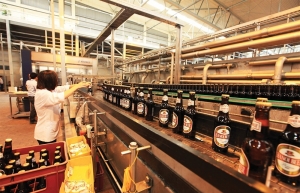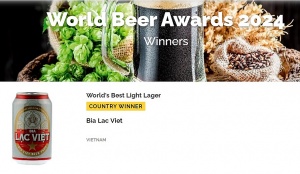Options narrow for tax on beer products
At a workshop announcing the report on assessing an increase in special consumption tax (SCT) on beer last week, Nguyen Minh Thao, head of the research group under the Central Institute for Economic Management (CIEM), said the amended draft law on the tax will have a direct impact on the production and business activities of enterprises in the beverage industry and related industries. “Increasing the excise tax on beer will affect over 20 industries and the total added value of the entire economy and state budget revenues. Policy proposals need to minimise negative impacts on workers and social security,” said Thao.
 |
| Even a slight change in taxes on beer can impact GDP in major ways Photo: Le Toan |
The report was conducted by the Institute for Strategy and Policy Research on Industry and Trade under the Ministry of Industry and Trade, along with the Vietnam Beverage Research Institute and experts from CIEM and the General Statistics Office.
The draft law on SCT is being amended in the direction of adjusting the increase in tax rate for beer, currently 65 per cent, with two proposed options. The first is to increase tax annually by 5 per cent from 2026, so that by 2030 the rate will be 90 per cent. The second option is to increase tax by 15 per cent in 2026 and then increase it annually by 5 per cent from 2027, so that by 2030 the rate will be 100 per cent.
The Vietnam Beverage Association (VBA) has also sent a document to the Ministry of Finance proposing to postpone the tax hike entirely until 2027, and raise the tax by 5 per cent every 2 years, reaching 80 per cent in 2031 to suit the economic context.
The report noted that increasing SCT on beer will affect GDP growth. Specifically, compared to the target growth scenario of 6.5 per cent under normal conditions, raising the tax on beer will dent GDP by 0.035-0.08 per cent depending on the option chosen. The rate would be 0.017 per cent if the VBA’s option is implemented.
The report indicated that on average, between 2018 and 2022, the beverage industry created nearly 87,000 direct jobs and millions of indirect job opportunities through more than five million households providing restaurant and catering services. Of which, the beer industry contributes more than half of the beverage industry’s workforce.
Accordingly, the income of workers in the beer industry is higher than the average income of workers in the beverage industry and significantly higher than the average income of the manufacturing industry.
Pham Tuan Khai, former legal director at the Government Office, said the report was one of the most detailed he has been involved in during his 30-year career. “The bottleneck of lawmaking in our country today is that the law cannot predict future problems. Therefore, our laws are very specific and difficult to implement,” Khai said.
“This report has comprehensively assessed the impact of the draft law, analysed and argued appropriately and convincingly, and helps the drafting agency not only see the practical picture but also predict the future of the industry.”
Dr. Nguyen Quoc Viet, deputy director of the Vietnam Institute for Economic and Policy Research, said the report has pointed out the principle of ensuring the sustainability of revenue sources. “Sustainable revenue sources mainly come from direct taxes on corporate and personal income rather than consumption. Meanwhile, research shows that direct taxes decrease sharply when increasing the SCT on beer according to the options proposed by the Ministry of Finance,” Viet said.
Regarding the goal of reducing the rate of alcohol consumption, Viet emphasised that tax is only one measure. “We must integrate and harmonise many different measures. These measures must ensure that people are directed towards responsible consumption,” Viet added.
Nguyen Hoang Giang, general director of Saigon Beer Trading Co., Ltd., said the report quantifies the impact of SCT options on the beer industry and is much needed. “Businesses always go hand-in-hand with government policies. When issuing policies, they need to take into account the impact of businesses and the social context,” Giang said.
Tran Ngoc Anh, HEINEKEN Vietnam’s corporate affairs director, said all options to increase SCT on beer have an impact on the economy, however the second option has the strongest impact.
“The economy has faced many challenges in the past 4-5 years due to the impacts of the global economic and political context and high raw material prices, while domestic purchasing power is decreasing,” Anh said. “There needs to be a plan to increase SCT harmoniously to achieve the goals of raising budget revenue, while still protecting the health of consumers and supporting a stable business environment and economic growth.”
| Nguyen Thi Kim Thuy, National Assembly deputy Danang
The law on SCT should consider the imposition of tax on sugary soft drinks. We should expand the subjects of SCT to all sugary drinks according to the National Nutrition Strategy and the National Plan for Prevention and Control of Non-Communicable Diseases and Mental Health Disorders for 2022-2025. In addition, I am concerned about the adverse effect of this policy because consumers may think that only sugary soft drinks are not recommended for use. In fact, many other types of sugary drinks contain higher sugar content than soft drinks. Moreover, sugary soft drinks according to Vietnamese standards is a much lower level compared to the concept of sugary drinks in general. Bui Thi Quynh Tho, National Assembly deputy Ha Tinh province
The draft law adds two more tax calculation methods, the absolute method and mixed method, but does not specify them in detail. I propose that, to be consistent with other entities, an absolute tax rate should be added for tobacco so that this item should be subject to a mixed tax calculation method. However, if the tax is calculated in the absolute method, it will not ensure fairness among taxpayers because low-priced and high-priced cigarettes are subject to the same tax amount. With the absolute tax, some types of cigarettes will increase by 175 per cent compared to the current tax rate, and some other types will increase by 25 per cent only. Thus, applying a relative tax rate method is more suitable than the absolute method. Nguyen Thi Kim Anh, National Assembly deputy Bac Ninh province
The drafters should add goods that are bad to for the environment to the list of SCT items, such as batteries, car tyres, plastic bags, and single-use plastic products. Regarding tax rates, roadmaps, and tax increases, it is necessary to consider the actual situation of the manufacturing industry, supply chain, raw materials, and consumer demand. If the tax increase is too high and sudden, it can have the opposite effect, like decreasing production, increasing counterfeit or poor quality goods, or causing tax losses for the state budget. The sudden tax increase on cigarettes may lead to increasing smuggling and tax evasion, declining production, narrowing of raw material growing areas, and significantly affecting the lives of workers and farmers involved in tobacco production. The two options for increasing the SCT on cigarettes as proposed in the draft law are too high for the next five years. We should reconsider the increase and the roadmap. For sugary soft drinks, the draft law stipulates only a tax rate of 10 per cent, which is lower than that of other countries. So we should consider the experience of other countries to raise it to 20 per cent, and building a suitable tax increase roadmap by 2030. For alcohol, I agree with increasing the SCT rate on alcohol in the proposed roadmap. However, I am concerned that the tax rate on beer is the same as that on alcohol above 20 degree proof. In fact, the higher the alcohol content is, the greater the health risks are. Why is the tax rate on beer higher than that on spirits, while the alcohol content of beer is typically much lower? The draft law should be revised to ensure effectiveness and feasibility. |
 | Beer industry compelled to adjust to potential tax impact Following a stressful few years of slumping demand, the beer industry is taking on even more challenging times, including the potential impact of special consumption tax, which leaves it finding new ways to prosper. |
 | SABECO wins at World Beer Awards SABECO and its products have received awards for their taste and quality as voted by the experts at the 2024 World Beer Awards. |
 | SABECO brands win big at 2024 International Beer Cup The brands of Saigon Beer-Alcohol-Beverage Corporation (SABECO) have won a series of awards at October’s International Beer Cup in Sapporo, Japan. |
What the stars mean:
★ Poor ★ ★ Promising ★★★ Good ★★★★ Very good ★★★★★ Exceptional
Related Contents
Latest News
More News
- Masan Consumer names new deputy CEO to drive foods and beverages growth (February 23, 2026 | 20:52)
- Myriad risks ahead, but ones Vietnam can confront (February 20, 2026 | 15:02)
- Vietnam making the leap into AI and semiconductors (February 20, 2026 | 09:37)
- Funding must be activated for semiconductor success (February 20, 2026 | 09:20)
- Resilience as new benchmark for smarter infrastructure (February 19, 2026 | 20:35)
- A golden time to shine within ASEAN (February 19, 2026 | 20:22)
- Vietnam’s pivotal year for advancing sustainability (February 19, 2026 | 08:44)
- Strengthening the core role of industry and trade (February 19, 2026 | 08:35)
- Future orientations for healthcare improvements (February 19, 2026 | 08:29)
- Infrastructure orientations suitable for a new chapter (February 19, 2026 | 08:15)




 Tag:
Tag:



















 Mobile Version
Mobile Version